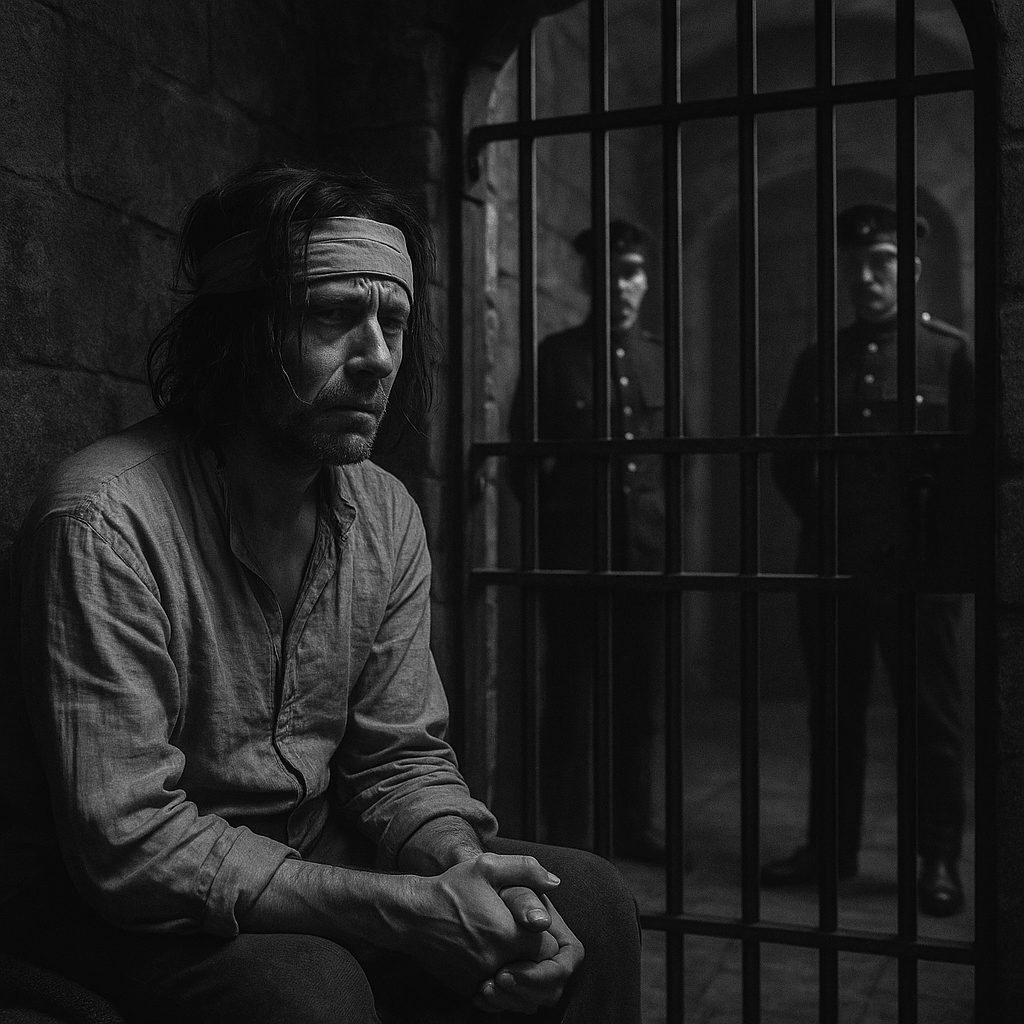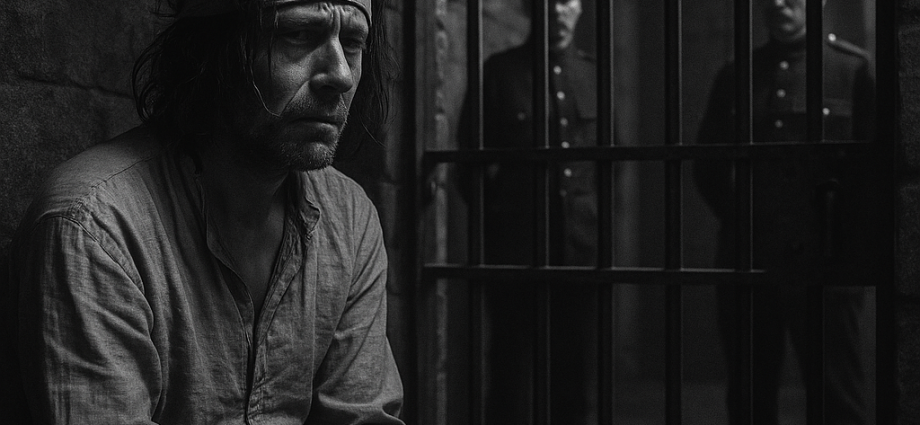By Staff Writer, The Times-Observer
Rodger “The Liar” Bianchovi, once the self-styled “chief editor” of the outlaw publication known as The Red Banner, will face the ultimate penalty before the dawn of Seventhday, following his conviction on multiple counts of sedition, falsification, and the willful spreading of disinformation calculated to undermine public order and faith in the Crown. The execution, to be carried out in the Yard of Justice within the walls of Inverness Prison, is expected to draw both solemn observers and a small crowd of the merely curious, though no public attendance is permitted.
 Bianchovi’s crimes, described by the Royal Prosecutor as “the textual equivalent of swinging a double-edged sword in a crowded marketplace,” have been the subject of fierce debate across the realm. His printed words — masquerading as news — were in truth so artfully dishonest that they deceived many of weak disposition and lesser understanding. His publication, The Red Banner, purported to expose corruption and tyranny, but instead trafficked in fevered invention and deliberate cruelty. Each issue dripped with venom; each headline was a cudgel meant not to inform but to injure.
Bianchovi’s crimes, described by the Royal Prosecutor as “the textual equivalent of swinging a double-edged sword in a crowded marketplace,” have been the subject of fierce debate across the realm. His printed words — masquerading as news — were in truth so artfully dishonest that they deceived many of weak disposition and lesser understanding. His publication, The Red Banner, purported to expose corruption and tyranny, but instead trafficked in fevered invention and deliberate cruelty. Each issue dripped with venom; each headline was a cudgel meant not to inform but to injure.
“Truth is the first victim of the revolutionary,” said the Prosecutor during closing arguments. “And in this case, it was murdered most foully by a man with ink-stained hands and a coward’s heart.”
The Lies That Unraveled the Liar
The Red Banner began as a mimeographed broadsheet passed hand-to-hand in taverns and workers’ halls. It grew in audacity as it grew in circulation, especially among the disaffected fringe of the Socialist Party of Eyehasseen — a political association long tolerated by the Crown so long as it kept its tongue civil. But under Bianchovi’s leadership, it abandoned even the pretense of civility.
He published names, addresses, and false accusations against loyal citizens. He called ministers “leeches,” officers “butchers,” and the King “a relic of blood and dust.” He described the Palace as “a monument to vanity” and even suggested that the very concept of monarchy was “an illness of the national soul.”
When asked during his trial whether he regretted any of it, Bianchovi replied that he only regretted “not printing in larger type.”
That arrogance served him poorly. Witnesses testified that many of his supposed “reports” were entirely fabricated — incidents, conversations, and conspiracies that existed only in the feverish mind of their author. What little truth he printed was poisoned by the manner in which it was framed, twisted, and repeated until it became indistinguishable from falsehood.
The Red Banner’s editorials, written under a dozen aliases, were found to have directly incited unrest in the Dock District last Wintertide, where three men were injured and one shop burned. “He didn’t strike the match,” said the Prosecutor, “but he poured the oil and handed out the torches.”
A Coward’s Finale
Those who have seen Bianchovi since his sentencing describe a pitiful spectacle. The once-swaggering editor, who thundered against “tyranny,” now trembles at the shadow of his own fate. Reports from within Inverness Prison suggest that he spends much of his time weeping, writing frantic appeals to imaginary friends, and pleading for mercy he would never have extended to others.
“He whimpers like a spoiled child who’s been caught stealing sweets,” said one guard. “All his courage was in his pen, and now the ink’s run dry.”
Witnesses say that Bianchovi has refused confession with the prison chaplain, insisting that he has “nothing to confess.” Such obstinacy may deny him even the peace of a reconciled conscience.
The Royal Warder, speaking on condition of anonymity, said, “We’ve had murderers go to their end singing hymns. We’ve had traitors salute the King before the lever fell. But this one — he’ll go squealing.”
A Lesson in Truth
Public reaction has been divided between satisfaction and fatigue. Many citizens see in Bianchovi’s fate the reaffirmation of justice; others see merely the inevitable conclusion of a man who mistook license for liberty.
“I used to read The Red Banner out of curiosity,” said a bookseller in the Market Quarter. “Then I realized it made me angry for no reason. Everything in it was bile. The King deserves loyalty, not lies.”
In the Royal Academy, students of journalism — a craft now formally regulated by charter — have been made to study excerpts of Bianchovi’s writings as examples of “moral rot concealed in eloquence.” One lecturer observed that his downfall serves as “a grim but necessary reminder that speech, like any weapon, can be abused unto death.”
The Ministry of Information has announced that The Red Banner will be formally proscribed, its printing plates melted, and its type fonts redistributed to legitimate presses. The archives will retain one complete copy of each issue, preserved “as evidence of the corruption of the written word when divorced from truth.”
The King’s Mercy Considered
Though petitions for clemency have reportedly reached the Palace, no word has been issued from the Royal Chancery. His Majesty is said to view Bianchovi’s case as a matter of grave principle: that freedom of the press must never become freedom to destroy. “If a man uses his tongue or his pen to rend the body politic,” said one courtier, “then he cannot complain when the sword cuts back.”
Still, a handful of idealists have gathered nightly outside the prison gates, muttering prayers for “truth in all its forms.” They are watched closely by the Constabulary, who have been instructed to permit no demonstration of sympathy beyond quiet petition.
As the hour of reckoning approaches, there is little doubt that Bianchovi’s name will enter the annals — not as martyr, but as warning. The Times-Observer, which has long championed fair reporting and allegiance to the common good, will continue to print the truth as guided by reason, loyalty, and moral courage — virtues of which Rodger Bianchovi knew none.
Epilogue: The Silence That Follows
When the execution bell tolls on Seventhday, it will not only mark the end of one man’s deceitful life, but the end of a foul whisper that has for too long echoed through the alleys of our fair realm. The presses of The Red Banner will fall silent, their poison spilled and spent.
And in that silence, perhaps, truth may breathe again.
